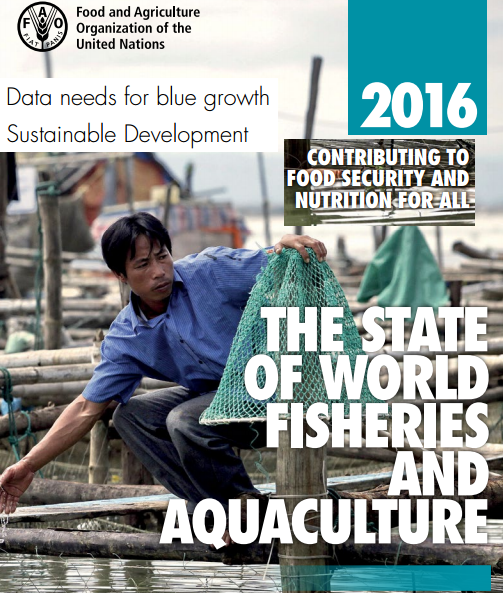The State of World Fisheries and Aquaculture (SOFIA) report: data focused on Sustainable Development


The State of World Fisheries and Aquaculture (SOFIA) report - published by FAO on July 7, 2016 - provides a comprehensive, objective and global up-to-date data and information about capture fisheries and aquaculture, including associated policy issues.
Did you know? “Marine areas beyond national jurisdiction cover 64% of the surface of the oceans, make up 40% of the earth’s surface, with marine living resources valued at well over US$10 billion annually” (Common Oceans)
“Globally, fish provided 6.7 percent of all protein consumed by humans, as well as offering a rich source of long-chain omega-3 fatty acids, vitamins, calcium, zinc and iron. Some 57 million people were engaged in the primary fish production sectors, a third of them in aquaculture” (FAO).
“One in ten people depend upon fisheries and aquaculture for their livelihoods, and we shouldn’t forget that women are key to the 2030 Agenda in fisheries” (Blue Growth blog, FAO).
The State of World Fisheries and Aquaculture (SOFIA) report
was released by FAO on 7th July 2016 – a couple of days before the 32nd session of the Committee on Fisheries (COFI) event & side events at FAO headquarters (Rome), to celebrate the entry into force of the The Port State Measures Agreement (PSMA) aimed at stamping out illegal fishing (watch this video).
The SOFIA report provides policy-makers, managers, scientists, stakeholders and indeed all those interested in the fisheries and aquaculture sector with a comprehensive, objective and global view of capture fisheries and aquaculture, including associated policy issues.
This SOFIA 2016 edition (see past editions of SOFIA) uses the latest official statistics on fisheries and aquaculture to present a global analysis of trends in fish stocks, production, processing, utilization, trade and consumption. It also reports on the status of the world’s fishing fleets and analyses the make-up of human engagement in the sector.
Some highlights from the SOFIA Report:
- global per capita fish consumption rises 20 above kilograms a year for the first time, thanks to stronger aquaculture supply and firm demand, record hauls for some key species and reduced wastage;
- the doubling since 1996 of the number of species in the FAO data base - now 2,033 - indicates overall quality improvements in the data collected;
- supply-chain and other improvements have also raised the share of world fish production utilized for direct human consumption to 87 percent or 146 million tonnes in 2016. That's up from 85 percent or 136 million tonnes in 2014;
- the growing fish-processing sector also offers opportunities to improve the sustainability of the fish supply chain, as a host of byproducts have multiple potential and actual uses, ranging from fishmeal for aquaculture, through collagen for the cosmetics industry to small fish bones humans can eat as snacks.
"Life below water, which the Sustainable Development Agenda commits us to conserve, is a major ally in our effort to meet a host of challenges, from food security to climate change. This Report shows that capture fisheries can be managed sustainably, while also pointing to the enormous and growing potential of aquaculture to boost human nutrition and support livelihoods with productive jobs," FAO Director-General José Graziano da Silva.
A key question is: Which will the future perspectives of development for the fisheries and aquaculture sector be?
FAO emphasizes that food and agriculture are key to achieving the 2030 Agenda for Sustainable Development.
Sustainable Development Goal (SDG) 14 (Conserve and sustainably use the oceans, seas and marine resources) expressly focuses on the oceans, underlining the importance of the conservation and sustainable use of the oceans and seas and of their resources for sustainable development, including through their contributions to poverty eradication, sustained economic growth, food security and creation of sustainable livelihoods and decent work.
FAO is advising Members on SDG implementation policies and processes, including follow-up, monitoring and review. It is collaborating with UN-Oceans, the UN Statistical Division, the Inter-Agency Expert Group on SDG indicators, the Inter-Agency Task Force on Financing for Development outcomes and means of implementation of the 2030 Agenda, and other partners.
FAO is also contributing to the High-level Political Forum on Sustainable Development, which is the main platform for SDG follow-up and review and which may draw on the work of other intergovernmental bodies and fora that review progress and discuss policies in specific areas, including the Committee on World Food Security and FAO’s Technical Committee on Fisheries COFI. The FAO Blue Growth Initiative (BGI) directly contributes to a wide range of SDGs
National, regional and global efforts by fisheries and aquaculture stakeholders aiming to achieve the 2030 Agenda will benefit from past and ongoing processes of collaboration, mutual support and international consensus building.
SOURCE:
The State of World Fisheries and Aquaculture (SOFIA, 2016)
(AGROVOC keywords: fisheries development; small-scale fisheries; inland fisheries; nutrition; food security; fishery production; fishery byproducts)
Report also available in: Spanish Russian Chinese (Simplified) Arabic French
“FAO encourages the use, reproduction and dissemination of material (and data) in this information product. Except where otherwise indicated, material may be copied, downloaded and printed for private study, research and teaching purposes, or for use in non-commercial products or services, provided that appropriate acknowledgement of FAO as the source and copyright holder is given and that FAO’s endorsement of users’ views, products or services is not implied in any way” (SOFIA Report).
You can also Sign in and review the Report.
RELATED LINKS:
Video interview: Manuel Barange, FAO Director of Fisheries and Aquaculture Policy and Resources Division, discusses the SOFIA report

